- Home
- Osteoporosis
- Solutions and remedies for heartburn and indigestion
Solutions and remedies for heartburn and indigestion
Indigestion and heartburn can spoil the best of dinners. What's all about?
This is a condition that is not serious for the majority of sufferers, unless you start to
take antacids regularly, in which case you will get a vitamin B12
deficiency. That is serious. Tingling in arms and hands and legs is a sign. It causes Pernicious Anaemia.
Nearly a half of Americans complain of severe heartburn at least once a month; and one in five have a serious form of the disease called GERD. That is a huge number of people. There are a heap of medications on the market, all with their side effects. Does it have something to do with what we are eating perhaps?
Or is something eating us?
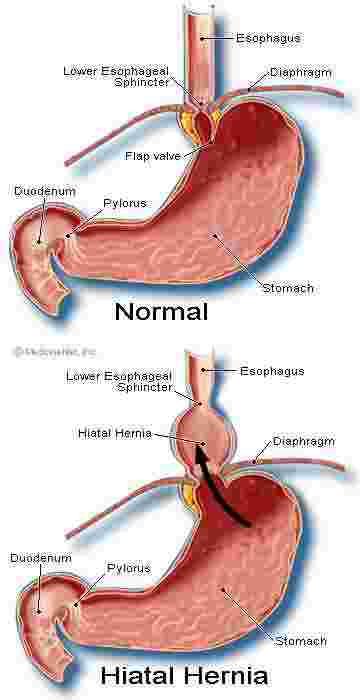
Perhaps you have been prescribed a common medication called a proton pump inhibitors like Prevacid that reduces acid production in the stomach in an effort to quell the fiery stuff in your oesophagus. But calcium absorption is dependent on a low pH in the gut, so there is a significantly higher incidence of osteoporosis and hip fractures associated with PPIs[1].
The Journal of the American Medical Association reports there is a 44% increased risk of hip fracture if you take proton pump inhibitors such as Nexium, Prevacid and Prilosec for just one month; that is huge.
This page was last updated by Dr Barrie Lewis on 9th April, 2023.
Sometimes the cure is worse than the disease. Is there a more natural way, with no side effects, that we could use?
"I would like to find a stew that will give me indigestion heartburn immediately, instead of at three o'clock in the morning."
- John Barrymore
But it does cause sufferers untold grief in the early hours. John Barrymore was certainly not the first to complain, and going by the number of antacids sold, it is on the increase.
Oddly antacids only aggravate the underlying problem which is only rarely an excess acid, mostly it is TOO LITTLE. That causes poor digestion.
It is no coincidence that Barrymore mentions stew. It probably contains a large amount of fat and certainly onions; and if he also enjoyed a bread roll and a tankard of beer with his meal, that's the end of the story. He will be suffering from indigestion heartburn.
Indigestion and heartburn in essence are a disturbance of the normal function of the stomach. It could be pathological, like an ulcer or a tumour, but usually it is not; possibly anatomical, like a defective valve that should prevent the contents of the gut refluxing back up the oesophagus.
It could be emotional, like anger or bearing a grudge.
But most usually, it is a mixture of foods that do not agree with you; and especially a refined carbohydrate like a bread roll or white rice.
"You do not get ulcers from what you eat. You get them from what is eating you."
- Edith Baum
That incidentally is not all true, but she makes her point; is there a psychosomatic factor to your heartburn?
The contents of the stomach is extremely acid to enable the enzymes to effectively digest protein, which must occur before they enters the next part of the gut, the duodenum. A low pH is also essential for absorption of vitamin B12, extremely important for your nervous system.
This is quite normal and it should not be concluded that too much acid is the cause of your indigestion and heartburn.
Quite the contrary, too little acid, leaving poorly digested
proteins is more likely problematic.
The other effect of taking antacids is to allow those partly digested proteins through into the small intestine. If these short chains of amino acids are absorbed into the blood stream, they will cause obscure allergic reactions like hayfever, asthma and autoimmune diseases in the body; our system thinks they are foreign matter.
Undigested proteins should not be found in the small intestine where the absorption occurs.
Hiatus hernia
The lungs and heart of the chest cavity are separated from the stomach and intestines by a large muscle called the diaphragm, through which the oesophagus must pass on the way to the stomach; a weak lower sphincter is often called a hiatus hernia.
A portion of the stomach bulges through the diaphragm into the chest cavity, allowing reflux and causing indigestion and heartburn.
In some people the hiatus or hole in the diaphragm weakens and enlarges. It is not known why this occurs. It may be hereditary; and it may be caused by obesity, exercises such as weightlifting or straining at stool.
Whatever the cause, a portion of the stomach herniates, or moves up into the chest cavity through this enlarged hole. Hiatus hernias are very common, occurring in up to 60 percent of older folk causing GERD, or gastro-esophageal reflux disease. Your dinner ends up in your mouth and sometimes worse, into your lungs.
What is interesting is that in some people this flow of toxic liquids causes acid burns, erosions of the oesophageal lining (which may be pre-tumour), but in others there is no damage at all leading to the diagnosis of NERD; non-erosive reflux disease.
Clearly it is complex, and there are many things at work. Could simple dietary changes make a difference, without the use of pills? Yes, do not be afraid to experiment.
The stomach is lined with a thick mucus to prevent the acid from attacking the wall. However the oesophagus is not so protected.
Should the valve that seals off the stomach be defective, then strong acid refluxes back into the oesophagus; where it may attack the lining which has no protection causing indigestion and heartburn. Even so, antacids are not the solution to the problem; dealing with the muscle called the diaphragm which forms the valve is another bet.
The contents of the stomach is the critical subject. This is mediated by many different processes such as the amount of fluid in the organ, the mixtures of different foods that you have just enjoyed and the nerve supply to both the muscles; and the glands that produce both acid, enzymes and other substances.
Black blood in the stool
FROM THE COAL FACE
"Doctor, do you think you can help my dad. He has terrible backache."
"That's an odd question, Minky. I treat bad backs all day long. You know that."
"Yes, of course, but his doctor says his problem is far too serious for a chiropractor."
"Well, is his doctor's treatment helping?"
"No, he has been getting terrible indigestion and heartburn and now blood in the stool, and his doctor says he has to stop taking the medicine. He is a bear with a sore back and so much pain in his tum."
Minky had been a patient for nearly two years. She suffered from regular miserable Headache Chiropractic that put her to bed for several days in the month before she started consulting me.
"Suggest your dad comes for a free consultation, Minky. It will involve an abbreviated examination, but no treatment to help him decide if Chiropractic could help him. Tell him to bring his X-rays, if he has any."
The upshot was that Minky's dad had a very routine problem
in the low back. Once he had completed a course of about ten treatments, was
doing all his exercises and came for an occasional visit every two or
three months, his problem became only a minor irritant. He no longer needed those life-threatening anti-inflammatory drugs.
His eyes opened wide when I told him that 14, 000 people had died in the USA in one year from gastric bleeds from taking anti-inflammatory medication.
It remains a mystery to me why doctors can think a back too serious for a chiropractor; but they are prepared to risk the patient's life with medication that their own research declares kills tens of thousands every year.
ANTI-INFLAMMATORY DRUGS should be a last resort, or prescribed only for a short period.
The point I feel sure is clear. If you have indigestion and heartburn and you are taking anti-inflammatories [aka NSAIDs], see your doctor immediately for a stool test. Are you passing blood?
Blood from the stomach makes the stool black, not red. At the same time, make an appointment with your chiropractor to treat the cause of the pain in your back. Medicating symptoms, in general but especially with NSAIDs, is plain bad long-term management.
Pernicious anaemia
VITAMIN B12 - have you been taking antacids regularly?
Vitamin B12 is vital for the nervous system. Do you know what Pernicious Anemia is? TINGLING IN ARMS AND HANDS AND LEGS is an early symptom and a marginal deficiency is now recognised in about a quarter of people over 50. There are various causes but the most common is too little stomach acid; and it is gravely worsened by antacids taken on a regular basis.
A much more common cause of a deficiency of B12, especially in older people, is a lack of stomach acid[2].
Lying on the right side
Many folk find that lying on the right side gives them significant indigestion heartburn at night; and often frank pain. A bubble of gas may be trapped in the fundus; the solution is either to stand up, and try to burp or to turn and lie on the left.
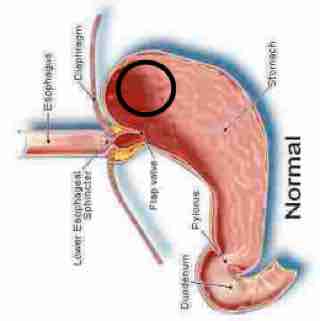
A bubble of gas may collect in the fundus of the stomach.
Notice in the graphic below that while lying on the left side the yellow gastric juice is far less likely to seep into the oesophagus and cause irritation of the mucosa which is not protected as the stomach has to be.
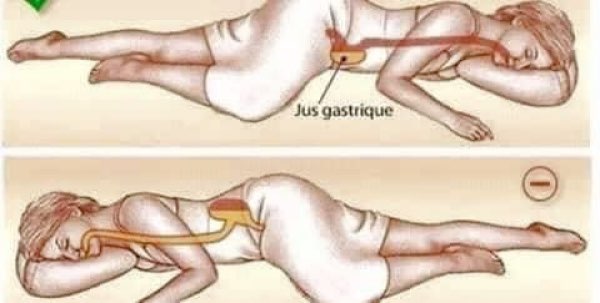 Lie on your left side for the first half of the night.
Lie on your left side for the first half of the night.Why do we hiccup?
Hiccuping is a reflex contraction of the diaphragm muscle, causing a sudden intake of breath that snaps the epiglottis closed. Irritation of the Phrenic nerve roots (C3 to 5) or one of the tissues supplied by it are the usual causes.
Read more at WHY DO WE HICCUP?
Chiropractic help
There is only anecdotal evidence that chiropractic help may contribute to indigestion heartburn.
Ask your chiropractor to check your
- mid-neck: CERVICAL FACET SYNDROME ... (innervation of the Phrenic nerve),
- mid-back: THORACIC SPINE PAIN ... from where the muscles and glands of the stomach are innervated.
- The diaphragm attaches to the lower six ribs. A subluxation causing Tietze's syndrome, breastbone pain, may be associated with heartburn, reflux and indigestion.
Follow one or all of these simple rules if you suffer from Indigestion heartburn:
- Do not drink any fluid with the offending meal (usually dinner) or for an hour afterwards.This includes water and coffee but alcohol and especially beer may be the the real problem, causing fermentation. They dilute the acid in the stomach resulting in poor protein digestion; and much worse possible auto-immune problems. Furthermore, liquids drunk after food, left above solid food are more likely to be refluxed.
- Drink soup at the beginning of the meal, perhaps with a break before the rest of the meal, so the fluids can start to pass through into the duodenum.
- Drink only very small quantities of water and no other liquids before going to bed. On lying down, any fluids in the stomach may reflux, carrying strong acids back into the oesophagus where there is no mucus protection; causing indigestion heartburn.
- Avoid bread, rolls and fruit puddings at dinner.
- No chocolate after dinner.
- Soups are healthy and delicious but for some people have to be eaten with care.
- Too much onion, leek and tomato a fruit can be an absolute nightmare for some people; a prime cause, particularly if it is eaten with bread rolls. Try starting the meal with a large chopped salad. For many people this alone will reduce 95% of the symptoms of indigestion heartburn.
- Too much fat is another common cause of indigestion and heartburn. Avoid rich stews at dinner. Scrumptious at lunch if your cholesterol is okay, just not every day.
- Dine like a pauper; small supper.
Kefir
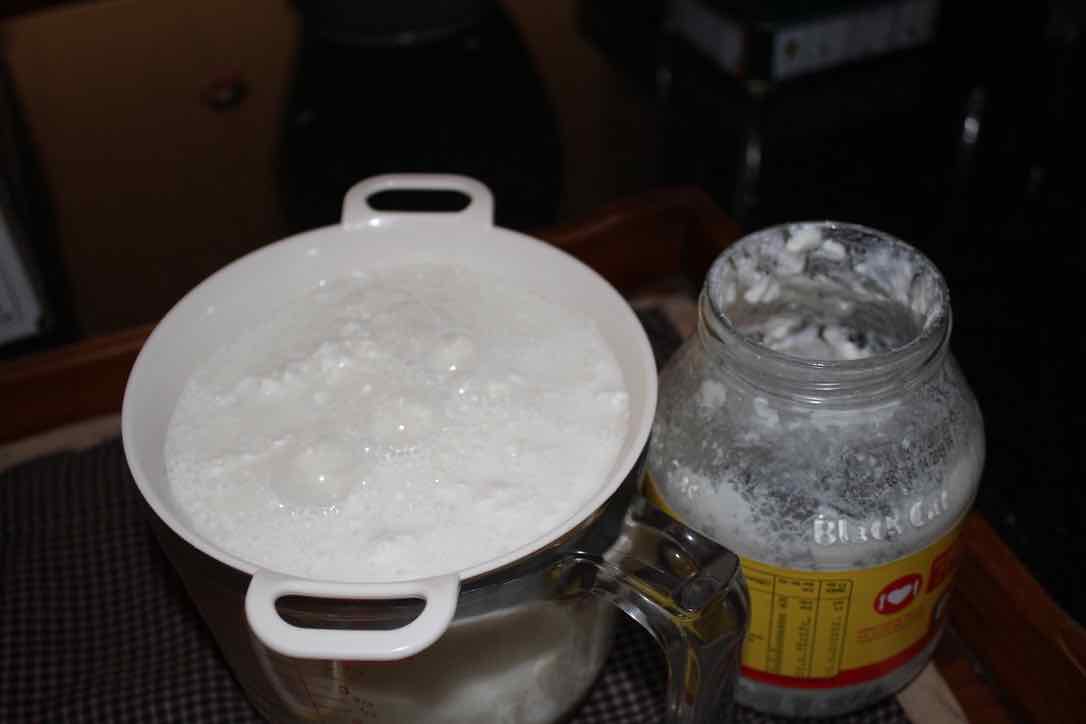
Kefir is an ancient drink emanating from Bulgaria; it is really what we would today call a probiotic. Made from raw or pasteurised milk, it consists of over 30 different strains of friendly bacteria, viruses and yeasts.
I have all my life suffered in one way or another from indigestion and heartburn. Astonishingly, within days of starting to enjoy kefir benefits, I have been virtually free of many years of pain and discomfort. It takes only five minutes to strain the little florets and top up the bottle with fresh milk.
The culture grows quite quickly so, if you have been helped, then one tends to pass it on. Here is what a close friend had to say.
Hi Doctor B,
Thanks so much for the kefir culture. I have made quite a lot, and the plant has grown to about three times the size. I am already giving some away. We like it very much and since I have been drinking it, I have had not heartburn at all.
Bye,
Tom
That sums it up. Initially I thought the real benefit of kefir had to do with the colon rather than the stomach, but on further reading it has also been shown to inhibit the growth of heliobacter, the bug that causes ulcers; I had a proven infection of this noxious bacterium after a gastroscopy. It did not respond to medication and proton pump inhibitors where then recommended which I refused of course.
Like I said, in only five minutes each morning you too can make the culture[3]; I now take a maintenance dose several times a week and am largely free of pain. I still have to sleep on my left side in the early part of the night.
If you enjoy reading then you will enjoy books by chiropractor Bernard Preston. He will keep you laughing as he retells his short stories from the clinic. Stories that will also help you be healthier and happier, and able to look forward to old age, instead of dreading it. Sound good?
Soon Frog in my Throat will be available as an ebook at half the price. Or less, and no postage. Watch this space. But first, Stones in my Clog, Preston's third chiropractic short stories. Rivetting stuff, like Priest in my Bed...

Indigestion and heartburn
Two types of foods
Professor Robert Russell, MD, states there are two different processes occurring.
1. Foods that increase the pressure in the stomach placing stress on the valve that separates it from the oesophagus above.
- Simply too much food in one meal
- Liquid with the meal
- Especially carbonated drinks
- Fatty foods
- Onions
- Chocolate
- Coffee
2. Foods that irritate the lining of the oesophagus, and hence the nerves.
- Fruit after dinner, especially citrus.
- Fruit drinks. OJ or apple juice for example.
- Wine.
- Very spicy foods.
In short rather than taking masses of pills, all of which have their side effects, perhaps it's time to start being the detective. Which of these are the spoke in your wheel? It may be just one of them, or several.
Anecdote
Yours truly suffered terribly with indigestion heartburn several nights a week having to sleep upright until about five hours after the meal.
Many of the above triggers were involved.
Finally, faced with a gastroscope, medication and the threat of cancer of the oesophagus, he took the bull by the horns. Giving up several beers before dinner made a huge difference.
I still have to be careful with a soup, bread and fatty stews. Beer was one of my problems. What's yours?
Surgery
There is nothing simple about an operation to fix a hiatus hernia. In my own case, the surgeon warned me that all burping would stop; the gases would instead have to travel the length of the alimentary canal, causing considerable lower bowel discomfort and bloating.
Giving up beer was a much simpler solution. Since taking kefir, I can now enjoy my tipple in moderation again.
"He was woken early by borborygmus as his insides fermented and his intestines ballooned with gas beyond their capacity."
- Ruth Dudley Edwards
Barrett's oesophagus
Having started this page by saying that indigestion heartburn is not usually serious, affecting nearly half the population, but there is one exception. Chronic acid reflux into the oesophagus sometimes causes abnormal changes in the cells of the lower part of the tube; it is strongly associated with a very malignant disease.
As always don't assume that it happens only to other people. Seek out the cause of your indigestion heartburn. That is why I decided to give up beer; I now drink a home-brewed probiotic called mead.
Rather than taking pills, being an ostrich take on the role of the dietary detective and find out whether some simple changes in your lifestyle cannot make the difference; or even difficult ones.
There is nothing simple about giving up alcohol or losing ten kilograms; but faced with the alternative of surgery or Barrett's oesophagus, I would try anything. Kefir has been my saviour; and giving up beer before dinner.
Sourdough bread
For many folk bread is the devil, particularly if eaten with an onion or tomato soup. A roll with dinner may be the beginning of a nightmarish evening.
A possible solution is to look out for, or bake yourself, sourdough bread. Gluten is the protein in wheat. It is rich in an amino acid called proline that forms strong links to its nearest neighbours; it is difficult to digest.
During the long exposure to lactobacillus in the leaven, before baking, gluten is made far more digestible.
Following an easy sourdough bread recipe may be the solution to your miserable night pain. I now bake it daily; it takes only five minutes. It's half the price of anything you can buy in the supermarket, and ten times as tasty; more important, no indigestion heartburn.
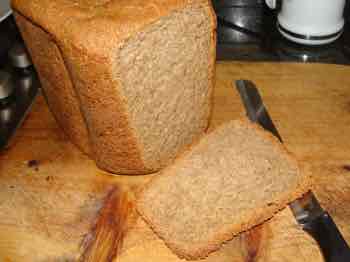
Links @ Indigestion Heartburn
- Go from Indigestion Heartburn to Healthy Living Tips ...
- Our $ 15 Greek salad: OLIVE GARDEN SALAD RECIPE ...
- Fish Soup
- Tingling in feet and legs
- The effect of proton pump inhibitors on fracture risk
- Inadequate stomach acid or medications that cause decreased stomach acid.
- How to make kefir: Web: https://tinyurl.com/2582v724
When browsing these links use right click and "Open Link in New Tab", or you may get a bad gateway signal.
- Home
- Osteoporosis
- Solutions and remedies for heartburn and indigestion
Did you find this page useful? Then perhaps forward it to a suffering friend. Better still, Tweet or Face Book it.

